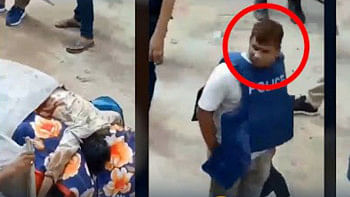Who will take care of Mizan's children?
ON Thursday 14 May 2009, a grenade explosion critically injured a two-year old boy and a two-month old girl. Under ordinary circumstances, these children would have the sympathy and support of most. But these children have had no such luck. Their parents' sins overshadow their plight as victims. Their father is "Boma Mizan", the explosives expert of the banned Islamic militant group Jamaatul Mujahideen Bangladesh (JMB), and their mother is his dutiful wife who in an effort to save her husband exploded a grenade, blowing up her right hand and injuring her children.
These children now lie helpless in their hospital beds, and a visit revealed their dismal condition with no adult supervision and minimum care.
Mizan's children are now under the jurisdiction of the Home Ministry and entrusted in the care of the Department of Social Services. The Children's Act 1974, under sections 55, 56, 57 and 59, stipulates that victimised children or children in need of care and protection be sent to a place of safety. According to section 55, a probation officer or police officer, not below the rank of Assistant Sub-Inspector, or a person authorised by the Government may take the child to a place of safety when there is reason to believe that an offence has been or is likely to be committed.
Sadly, the law did not apply for Mizan's children.
Officials from the relevant Department, who happen to be present at the hospital where the children are admitted, are reluctant to get involved because 'the issue is politically sensitive.' After all, who would take on the risk of abetting children of known terrorists? Grappling with the fear of terrorists and their bombs, minds somehow fail to see these children as anything but spawns of terrorism. The sights of the injured, helpless children only serve the purpose of reminding us of the cruelty and violence we associate with their parents. We forget that these children are also victims of the crimes committed by their parents.
Mizan's children are not the first children to be denied care or justice simply because their cases are perceived to be "politically complicated". The children of Sheikh Abdur Rahman, the executed leader of JMB were initially imprisoned for the crimes of their father. The ten-year and eight-year old sons were released in 2007 after spending time in a Kishore Unnayan Kendra, state run juvenile development centre, though they were never charged with any known cases of terrorism, sedition or violence. Bangla bhai's children are still serving time, for crimes unknown, with their mother in Mymensingh jail.
Once children come in contact, or worse still, are in conflict with the law, rehabilitation is crucial to keep them from a life of crime. In the case of children who have inadvertently become indirectly involved with criminal activity, it is the responsibility of the State and the community to give these children a fresh start at life.
Their families had disowned both Bangla bhai and Boma Mizan. If their relatives refuse responsibility of their children, they will become wards of the State. In that case, the State will be even more responsible for the safekeeping of these children.
What makes matters even more complicated is their link with extremely dangerous terrorist organisations that prey on young minds, and where indoctrination takes place in the earlier years. Ignoring these children, especially at the time of their need, will create resentment for the system in the minds of these children, and give anti-establishment terrorist outfits like JMB easy access to them.
We need to remind ourselves that social marginalisation will only alienate these children and force them to choose the side of those who are only too eager to embrace them. We can't let them become terrorists. We can't push these children into the life we punish their parents for. Nor should we punish them for the crimes of their parents. Unless we step up now and take charge of these children, they might follow into their fathers' footsteps.
The Constitution tells us that adults must always attend children under the age of 18. Children should either be in the care of their family, and when that is not possible, the responsibility of the children shall lie with the State. As a signatory to the United Nations Convention on the Rights of the Child, the Government of Bangladesh has committed to protecting and ensuring children's rights and has agreed to hold itself accountable for this commitment before the international community.
Mizan's children have a right to life, survival, development and protection and the Government of Bangladesh is now responsible for ensuring these basic rights for these children.
Fariha Sarawat is a member of Drishtipat Writers Collective and works for Save the Children, UK.

 For all latest news, follow The Daily Star's Google News channel.
For all latest news, follow The Daily Star's Google News channel. 




Comments